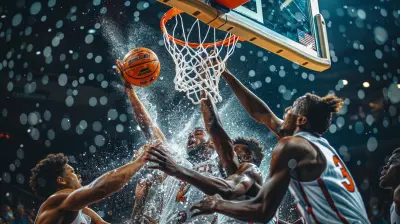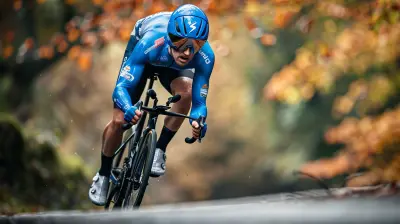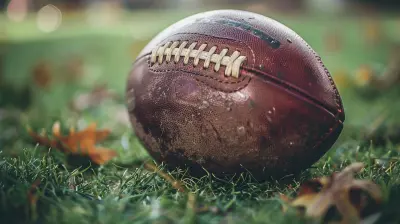The Role of Nutrition in Team Management
26 September 2025
When you think of managing a sports team, what comes to mind first? Probably practice sessions, game strategies, training schedules, and maybe even team dynamics. But here's something many overlook—nutrition.
Yep, that’s right. Nutrition isn’t just about counting calories or sipping protein shakes. It plays a massive role in how athletes perform, recover, and even bond as a team. So, if you’re a coach, a team manager, or even a passionate fan, this one’s for you. Let’s talk about how proper nutrition can be a game-changer in team management.
Why Nutrition Can't Be Ignored in Team Management
You can have the best coaching staff, cutting-edge facilities, and all the talent in the world. But without proper nutrition? It’s like trying to win a Grand Prix with no fuel in the tank. Athletes are like high-performance engines—they need the right fuel, at the right time, and in the right quantity.Healthy food doesn’t just help improve performance; it also reduces injuries, speeds up recovery, and enhances focus and mood. Think about it—if your team feels sluggish or gets injured often, what’s the point of all those drills and training sessions?
Building a Nutrition-First Culture
Start With Education
First things first: knowledge is power. A lot of athletes—especially younger ones—don’t know what a balanced diet looks like. It’s your job as a team manager or coach to bring in nutritionists or create resources that educate your team.You don’t have to turn your locker room into a science classroom, but simple stuff like why carbs are important before a match or how protein helps muscle recovery can make a big difference.
Lead by Example
Yep, actions speak louder than words. If you’re munching on chips and sipping soda during practice, don’t expect your players to go for a salad after a workout. Encourage healthy habits from the top down.
The Science of Nutrition for Athletes
Macronutrients: The Building Blocks
Let’s break it down.- Carbohydrates – These are the main energy source. Think of them as the gasoline in your car. Before a big game or intense training, athletes need good carbs like whole grains, fruits, and veggies.
- Proteins – These are the repair workers. After training or a match, muscles need protein to repair and grow. Chicken, fish, eggs, and plant-based sources like lentils are top picks.
- Fats – Not all fats are bad. Healthy fats like avocados, nuts, and olive oil provide long-term energy and help with brain function.
Micronutrients: The Unsung Heroes
Vitamins and minerals don't get as much attention, but they’re just as vital. Calcium, iron, magnesium, and vitamins A, C, D, and E all play specific roles in muscle function, energy production, and immune health.Hydration also falls under this category—water, electrolytes, and sometimes sports drinks (with low sugar) keep things running smoothly.
Nutrition Timing: When to Eat Matters
It’s not just about what you eat, but also when you eat.- Pre-game: Load up on complex carbs about 3–4 hours before. Add a bit of lean protein and avoid greasy, fatty foods or anything high in sugar.
- During the game: Hydration is key. For longer games, quick carbs like bananas or sports gels can help.
- Post-game: Within 30–60 minutes, get a mix of protein and carbs to start the recovery process.
This timing can optimize muscle recovery, prevent fatigue, and improve overall performance.
Recovery and Nutrition Go Hand in Hand
Ask any athlete, and they’ll tell you—being sore the next day is no joke. Nutrition plays a huge role in recovery.Protein helps rebuild torn muscle fibers, while carbs refuel the glycogen stores. Including anti-inflammatory foods like berries, turmeric, or fatty fish can even reduce soreness and speed healing.
A well-fed body recovers faster, and a faster recovery means your team gets back to training quicker and stronger.
Team Meals: The Ultimate Bonding Tool
Here’s where nutrition becomes more than just science—it becomes culture.Organizing regular team meals, whether it’s a healthy breakfast after a morning workout or dinner after a game, does wonders. It fosters camaraderie, builds trust, and creates a shared sense of purpose.
You’re not just feeding bodies; you’re strengthening relationships. And those relationships can be the secret sauce for championship-level chemistry.
Individual Needs Within the Team
It’s important to remember that every athlete is different.- A 16-year-old female soccer player has different nutritional needs than a 22-year-old male rugby player.
- Some athletes may be vegan or vegetarian.
- Others might have food allergies or intolerances.
Customizing nutrition plans or at least being mindful of individual needs can go a long way in keeping your team healthy and happy.
The Coach’s Role in Reinforcing Good Nutrition
A coach doesn’t need to be a certified dietitian, but you should be a vocal advocate for nutrition.- Encourage hydration during practice.
- Praise team members who make smart food choices.
- Discourage fast food post-game.
- Work with team parents or staff to provide better food options during travel.
Basically, be the hype person for healthy habits.
What About Supplements?
Supplements can be part of the equation, especially for high-performance teams. But—and this is a big but—they should never replace real food.Whey protein for recovery? Sure.
Creatine for strength training? Maybe.
Energy drinks with high caffeine? Probably not a great idea.
Always consult a qualified sports nutritionist before introducing supplements. And remember, simple, clean, whole foods should always come first.
Travel Eats and Nutrition on the Road
Traveling for away games or tournaments? That’s when things can get tricky.Fast food joints and gas station snacks are everywhere. But with a bit of planning, your team can stay on track.
- Pack healthy snacks like trail mix, fruit, or protein bars.
- Book hotels with kitchens or microwaves.
- Scope out local restaurants with healthy menus.
- Stay hydrated—planes and buses can be dehydrating!
Being proactive about travel nutrition can be a total game-saver—literally.
Common Nutrition Mistakes to Avoid
Even with the best intentions, teams can fall into these traps:- Skipping meals: Leads to low energy and poor performance.
- Overloading on protein: More isn’t always better.
- Underestimating hydration: Dehydration kills performance.
- Relying on junk food during tournaments: Tempting, but damaging.
Awareness is half the battle. Don’t let these mistakes cost you the win.
Integrating Nutrition into Your Team Strategy
Alright, so how do you bring it all together? Easy—make nutrition part of your game plan.- Hold short workshops or Q&A sessions with nutritionists.
- Share weekly meal tips or recipes in your team's group chat.
- Design practice schedules that account for fueling and recovery needs.
- Use positive reinforcement to reward great nutrition habits.
When nutrition becomes just as important as training or game planning, you’ll see the difference. Better performance, fewer injuries, and a more united team.
Wrapping It Up
So, what’s the takeaway? Nutrition is not a side note in team management—it’s a cornerstone. Fueling your athletes the right way sets the tone for everything else: energy, strength, endurance, focus, and even team culture.It’s not just about making them better athletes; it’s about making them healthier, more resilient, and more united as a team.
So next time you’re drafting your team strategy, don’t forget the most important play: what’s on their plate.
all images in this post were generated using AI tools
Category:
Team ManagementAuthor:

Everett Davis
Discussion
rate this article
1 comments
Thalia Hall
Nutrition is a pivotal yet often overlooked aspect of team management, profoundly influencing athlete performance and recovery. By prioritizing tailored dietary plans, teams can enhance endurance, reduce injuries, and improve overall morale. Integrating nutrition education within training regimens fosters a culture of health that supports both individual and collective success.
October 9, 2025 at 4:40 AM

Everett Davis
Thank you for highlighting the critical role of nutrition in team management. Your insights on tailored dietary plans and nutrition education are essential for optimizing athlete performance and fostering a healthy team culture.


